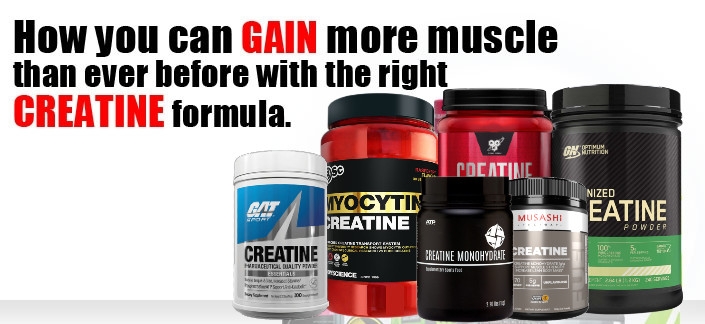How You Can Gain More Muscle Than Ever Before With The Right Creatine Formula

Creatine occurs naturally in vertebrates and supplies cellular energy in the body, mostly to muscle. Creatine is produced primarily in the kidney and liver from the amino acids arginine, glycine and L-methionine.
When consumed, it actually increases the uptake of Adenosine Triphosphate (ATP) which is considered to be the 'energy currency' of life. It sounds a little uninteresting until you find out what it really does. This bio-amino acid isn't a nutrient, or even required by the body as a supplement, but when used correctly and in the proper dosage, the results will amaze anyone who is interested in gaining bulk and who is committed to fitness.
But how does it work? When creatine is consumed in powder form, the muscles in the body automatically react by retaining water, but that's not the secret. It's actually during the workout that the bio-synthesis effect occurs, and the energy output directed to the working muscle is intensified.
Creatine is able to recycle the molecule we use for energy ATP, which supplies short energy bursts. Phosphocreatine is able to resynthesize ATP from ADP (Adenosine Diphosphate) allowing a faster reaction, perfect for repetitive maximal exercise, such as weight training. That's why it's important to take creatine supplements before the work out to maximise performance, increase power and maximise mass gains.
There are different ways to actually use creatine. The first is with the intention of rapid loading. This is achieved by taking repeated doses, 5g around four times a day for five days. This program will accelerate your gain over a short period, and you will see a remarkable difference by the end.
This is only recommended if you are lifting intensely at the same time, as it is the contraction of the muscle that triggers the absorption of the creatine into the body. If not the body will only retain water, and will lose it naturally if you stop taking the supplement. The second is low loading over a longer period, which is 3g per day over a 28 days.
This program should include a daily workout which increases bulk slowly, but with more permanent results. The third way is to continue with the dose, at 3 g a day, after the rapid gain program, or the low gain program to maintain your condition.
The best time to use creatine is before meals and before workouts. This is because blood flow is stimulated and the amino acid travels through the blood stream to all muscle areas. Often it is best to take it mixed with fruit juice, as the insulin produced by the fructose also acts as a really efficient carrier for the creatine.
If it is a quality product, you will find that the powder dissolves well in liquid, has no real taste, and doesn't leave a messy residue at the bottom of the glass. A lot of studies have been conducted on the use of creatine, and when used correctly, the benefits are excellent.
It is recommended that people who are already fit, with no underlying health problems, are the best candidates for this product. When used as recommended, creatine has been reported to provide a substantial increase in lean muscle mass, increased power output during workouts, extra strength gained over time, and a shorter recovery time.
There has even been some evidence to suggest that brain power is also improved, as creatine is a pure protein that is delivered directly to the brain when blood flow is accelerated. For a single purpose user, who wants to focus on increasing muscle gains, creatine has been the go to muscle building product for many years.
And now, with technically advanced extraction and purifying methods now in use, the effects of the creatine are even better. The benefits in muscle growth and recovery have been substantiated over and over again, due to its positive effects on supporting protein synthesis and the recycling of ATP. It's a wise choice to give your body the power and strength it needs to perform with naturally derived creatine.
Benton D, Donohoe R. The influence of creatine supplementation on the cognitive functioning of
vegetarians and omnivores. Br J Nutr. 2011; 105(7):1100-5.
Burke DG, Chilibeck PD, Parise G, Candow DG, Mahoney D, Tarnopolsky M. Effect of creatine and
weight training on muscle creatine and performance in vegetarians. Med Sci Sports Exerc. 2003;
35(11):1946-55








